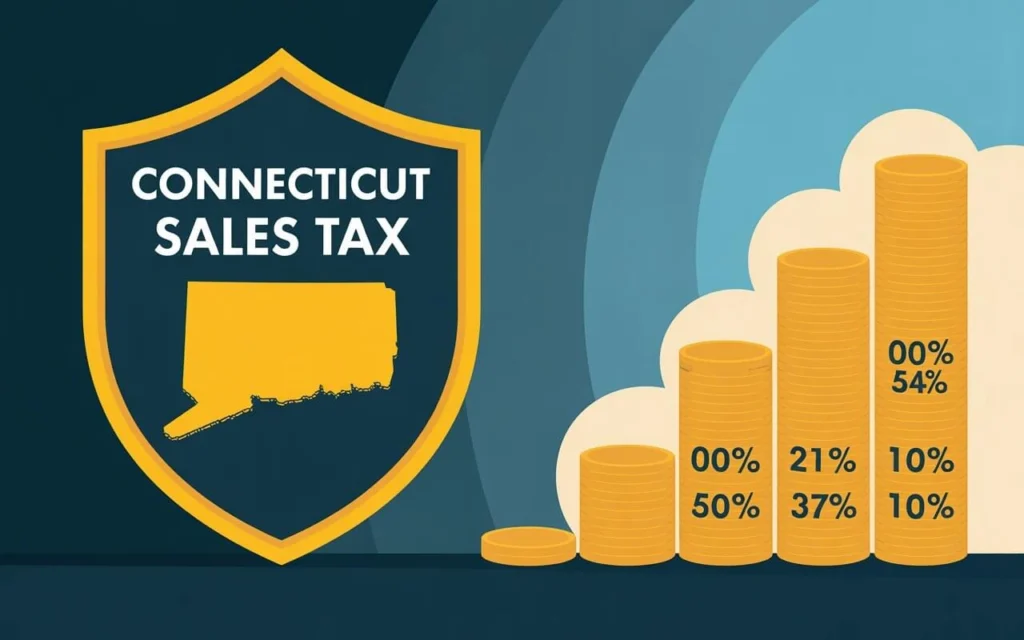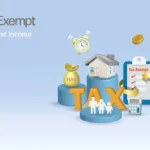The Connecticut sales tax is a statewide flat rate of 6.35%. This rate applies to most retail sales, leases, and rentals of tangible personal property and certain taxable services. Unlike many other states, Connecticut does not permit local jurisdictions to impose additional sales tax, which simplifies rate calculations for both consumers and businesses.
However, some items and services are taxed at a higher or lower rate. For example:
- Luxury goods over $5,000: taxed at 7.75%
- Rental of motor vehicles for 30 days or less: taxed at 9.35%
- Computer and data processing services: taxed at a reduced 1%
These variations highlight the importance of understanding exactly what’s being sold to charge the correct tax rate.

Content
Is Services Taxable in Connecticut?
Yes. One of the defining features of Connecticut sales tax law is that it applies to a wide range of services, not just products. This reflects a national trend of states expanding tax bases in response to shifts in consumer behavior and revenue needs.
Common taxable services in Connecticut include:
- Automobile repair and towing
- Cleaning services (commercial and residential)
- Real estate maintenance and landscaping
- Hairdressing, barbershop, and beauty salon services
- Massage therapy and wellness treatments
- Pet grooming and kennel services
- Computer training and software support
- Storage services (including self-storage units)
- Parking lots and valet services
- Event planning, DJ, and entertainment services
- Advertising and graphic design
- Tattooing and body piercing
Even some professional services like business consulting may become taxable if bundled with other services or deliverables.
What Items Are Exempt from Connecticut Sales Tax?
Connecticut provides exemptions to protect access to essential goods and services. Understanding exemptions is just as important as knowing what’s taxable—misapplying them can result in penalties.
Items exempt from Connecticut sales tax include:
- Grocery food items (excluding snacks and prepared food)
- Prescriptions and certain over-the-counter medications
- Children’s car seats and booster seats
- Certain medical devices, such as oxygen tanks and diabetic supplies
- Clothing and footwear under $100 per item
- Textbooks for enrolled college students
- Newspapers, magazines, and periodicals
- Sales to federal or state governments and exempt organizations
- Utilities for residential use, including electricity, gas, and heating oil
To qualify for exemption, customers must sometimes provide valid exemption certificates, which the seller must retain in case of an audit.
Digital Products and Connecticut Sales Tax
As the digital economy grows, Connecticut has adapted its tax code to apply sales tax to digital goods and services. The following are typically taxable:
- Downloaded software
- Streaming services like Netflix and Spotify
- E-books and digital publications
- Online gaming
- Web hosting and domain registration
- SaaS (software as a service) platforms
SaaS offerings, in particular, fall under computer and data processing services and are taxed at the reduced 1% rate. However, this can vary depending on the nature of the product—making it crucial for software vendors to categorize their offerings correctly.
Do You Need to Collect Connecticut Sales Tax?
Businesses must collect Connecticut sales tax if they have nexus in the state. Nexus means a connection significant enough to require compliance with local tax laws. Nexus can be established by:
- Having a physical location (office, store, warehouse)
- Employing workers or contractors in Connecticut
- Storing inventory in a third-party warehouse (e.g., Amazon FBA)
- Selling remotely and exceeding $100,000 in gross sales or 200 transactions annually to Connecticut customers
Once nexus is established, a business must:
- Register with the Department of Revenue Services (DRS)
- Collect Connecticut sales tax on all taxable transactions
- File periodic returns (monthly, quarterly, or annually)
- Remit payments by the due date to avoid fines and interest
Filing and Payment Requirements
Sales tax returns in Connecticut can be filed online through the Taxpayer Service Center (TSC). Filing frequency is determined by the DRS based on a business’s taxable sales volume.
- Monthly filing: if annual sales tax liability exceeds $4,000
- Quarterly filing: for medium-volume sellers
- Annual filing: for low-volume sellers
Returns must be filed even if no sales tax is due, or penalties may still apply. Businesses should maintain clear records of all transactions, tax collected, and exemption certificates.
Staying Compliant with Connecticut Sales Tax
To remain compliant with Connecticut sales tax laws, businesses should:
- Stay current on tax law changes via DRS updates
- Use automated tools to track sales, rates, and filing deadlines
- Regularly audit their taxable and exempt items/services
- Train staff on sales tax procedures and documentation
- Consult tax professionals for complex or high-volume operations
Cloud-based accounting platforms and tax automation services can dramatically reduce compliance risk and improve accuracy.
Final Thoughts on Connecticut Sales Tax
The Connecticut sales tax system is nuanced, especially with its inclusion of many services and digital goods. While the flat 6.35% rate offers simplicity, variations for certain products and services add complexity. Businesses must be proactive in understanding what’s taxable, monitoring economic nexus thresholds, and meeting filing requirements.
A strong compliance strategy not only helps avoid penalties but also builds customer trust. Whether you’re selling online, in-store, or across state lines, knowing the rules of Connecticut sales tax is vital for long-term success.
FAQs
Do out-of-state sellers need to collect Connecticut sales tax?
Yes. If they meet the economic nexus threshold—$100,000 in annual sales or 200+ transactions—they must register and collect Connecticut sales tax.
How do I apply for a Connecticut sales tax permit?
You can apply online through the Connecticut Department of Revenue Services (DRS) via the Taxpayer Service Center (TSC).

Hi, I’m Dan and I write blogs for businesses. I’ve been doing this since 1994 and have written over 10,000 blog posts (and counting). I love writing about what you’re passionate about and how to make your business successful. So if you want to know more about blogging or social media marketing, just let me know!




